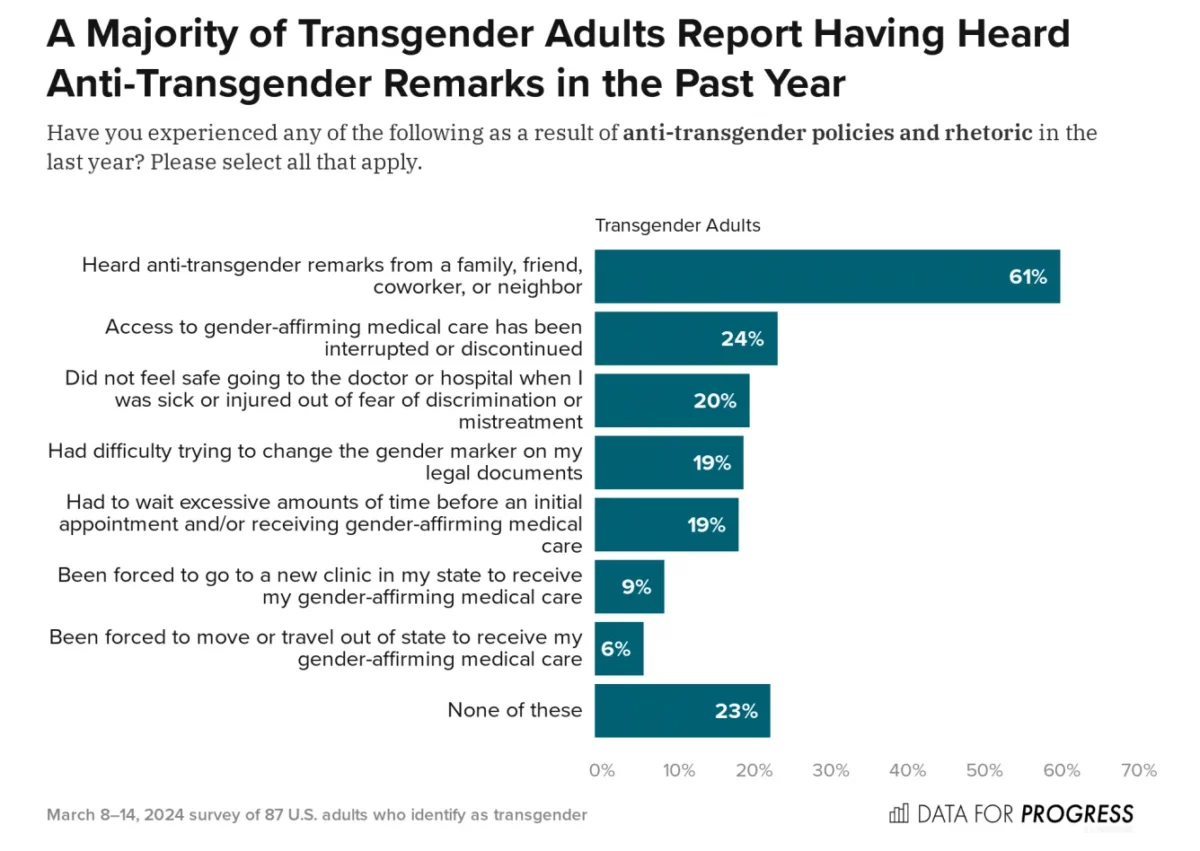In recent years, several laws targeting transgender adults have been proposed or enacted. These laws eliminate Medicaid coverage for transgender healthcare, permit pharmacists and hospital systems to discriminate against transgender patients, and impose restrictions on providers in various ways. Until recently, little information was available on how these new statutes affect transgender adults. While their care is often not explicitly prohibited, they may still experience disruptions due to anti-transgender laws. Now, a just released Data for Progress poll reveals that 24% of transgender adults have had their healthcare disrupted or discontinued as a result of anti-transgender legislation.
The survey, focusing on transgender and LGBTQ+ respondents, specifically questioned transgender individuals about the impact of anti-transgender policies or rhetoric on their lives. Among the transgender respondents, 24% reported that their access to gender-affirming care was interrupted or discontinued in the past year. Considering the Williams Institute’s estimation of 1.6 million transgender Americans, this percentage translates to more than 380,000 transgender adults whose care has been disrupted by recent anti-transgender legislation or rhetoric.
You can see the results of this poll question here:

While the survey does not detail the specific disruptions to healthcare access, a range of recent legislative actions and policy amendments may play a role. Several laws and updates in state policy have barred Medicaid from covering gender-affirming care. For example, South Carolina has recently revised its policy to eliminate coverage of transgender healthcare for individuals of all ages. In addition, states such as Florida have introduced strict restrictions, effectively banning up to 80% of all gender-affirming care for transgender adults within the state. A number of states have also enacted laws allowing religious-based medical discrimination against transgender individuals, allowing doctors, pharmacists, and even receptionists and cashiers to decline the dispensation of hormone prescriptions to transgender people. Furthermore, Idaho has recently passed legislation that prohibits the use of public funds or facilities for providing any gender-affirming care, potentially causing significant disruptions to transgender healthcare within the state.
The findings are significant, and show that transgender youth are not the only ones impacted by recent anti-transgender legislation. In addition to the 50% of transgender youth that live in states that have barred or heavily restricted gender affirming care, transgender adults appear to also be impacted by recent anti-trans legislation and rhetoric.
The consequences of recent legislation and rhetoric extend beyond disruptions in medical care. The survey also inquired about the concerns transgender individuals have regarding discrimination and harassment. The findings are alarming: 68% of transgender adults express concern about facing discrimination and harassment in restrooms, 64% report similar apprehensions about nightclubs, and 62% fear engaging in public displays of affection with their partners. As a result of these concerns, 44% of transgender adults indicate they have contemplated relocating or have already relocated from their community or state due to anti-LGBTQ+ legislation.
See this question of high levels of concern from transgender people over several basic activities:

Anti-transgender policies targeting adults seem to be increasingly prevalent. In several states, legislation has been proposed and passed to end all legal recognition of transgender individuals. Additionally, recent audio recordings from Republican legislators in Ohio and Michigan reveal an “endgame” aimed at ending transgender care “for everyone.” Before this latest poll, the extent of the disruption caused by these laws and policies on transgender adults was largely unclear. Many are now finding themselves forced to leave their states simply to access necessary care.
This piece was republished with permission from Erin In The Morning.
